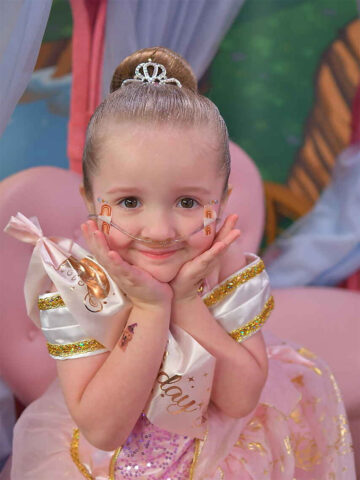When Caleb was born, his parents were thrilled to grow their family with a healthy baby boy. The first two years of Caleb’s life were typical and the family of four enjoyed spending time together.
Three years later, his mother’s keen eye and a pediatrician’s intuition ultimately led to an unexpected diagnosis that would alter the course of his family’s future.
Journey to a life-changing diagnosis
At Caleb’s 3-year well-check, his mom Marie noticed he’d begun to walk oddly, and she mentioned it to his pediatrician. That doctor performed a physical exam and noticed the bones in Caleb’s chest weren’t growing as they should have been, so he ordered X-rays of his chest and hips which eventually came back normal.
“I still remember when we got the clear X-rays and our pediatrician told us, ‘I still think there is something wrong with Caleb. I don’t know what it is yet, but we are going to find out’” Marie recalls. “I knew he had been a pediatrician for decades and treated thousands of children and I trusted his instinct. That is when the process really began, and every moment counts when you’re searching for a diagnosis.”
Caleb’s pediatrician referred him to Dr. Touran Zadeh, medical director of genetics services at CHOC. Through a blood sample and testing, she was able to diagnose Caleb with mucopolysaccharidosis (MPS) type II, a rare lysosomal storage disease.
What is MPS II?
Six out of 1 million children are diagnosed with MPS II. The lysosomes in each cell are required to get rid of the cellular waste that each cell produces. Caleb’s lysosomes do not work properly, so his body cannot eliminate the cellular waste. His body stores the waste in his joints, bones, heart, liver and lungs — almost every organ system in his body is affected.
There are seven types of MPS, all of which are inherited and can share very similar physical symptoms. The physical symptoms may include thickening of lips and skin, enlarged liver and spleen, hernias, recurrent ear infections requiring ear tube placement, joint pain and stiffness, and short stature. Neurological symptoms are present in some types of MPS and may vary in severity.
Meeting his care team
“Within a few days, we were in CHOC’s metabolic clinic and meeting Dr. Raymond Wang, a metabolic disorders specialist,” recalls Caleb’s dad Rory. “It felt like our world was crumbling down. Our dreams for Caleb were crushed. But we knew that Dr. Wang had a tremendous amount of compassion; he was so concerned for Caleb.”
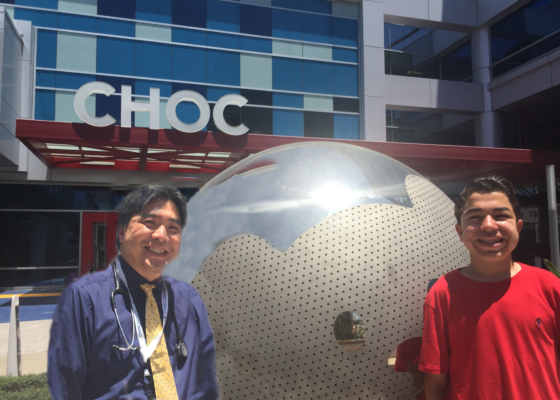
In the metabolic clinic, the family found the comfort they had been seeking.
“The moment we walked into CHOC, I finally felt comfort,” Marie says. “Our metabolic nurse was very friendly and concerned about us.”
Rory adds, “When we walked into the patient room, we weren’t just another number. We had all these experts in one room, but they also had really big hearts.”
Over the past 11 years, the family has since formed a special bond with each of the doctors on their care team, but especially with Dr. Wang.
“Dr. Wang was there to encourage and comfort us,” Rory says. “Our faith also helped bring us through the storm.”
Navigating life with MPS
A few months after Caleb’s diagnosis, his team placed a port-a-cath in his chest to accommodate his weekly infusion treatments. Caleb receives a four-hour enzyme replacement treatment every week to help eliminate the buildup of cellular waste in his body. This treatment helps patients with MPS II but is limited to only reaching soft tissue such as the liver, spleen and kidneys; it does not reach the joints, spine or brain.
For the first year, he received this treatment at The Dhont Family Foundation Outpatient Infusion Center at CHOC Hospital. To help comfort Caleb and get him through the treatments, the staff would give him a new toy every week.
“When we transitioned to receiving weekly infusions at home under the care of a home health nurse, Caleb was so used to getting a new toy every week that we decided to start buying him toy cars,” Marie says. “He has collected over 125!”
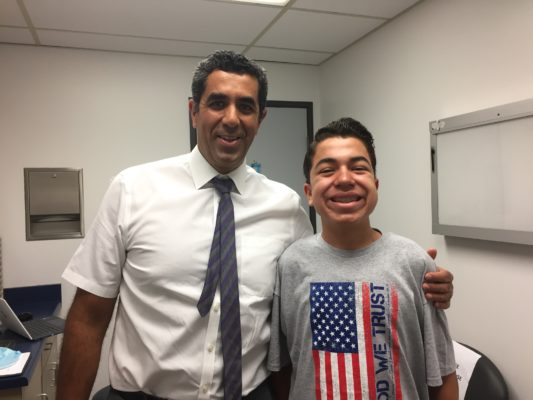
Around that time, Caleb was also placed on two heart medications to treat a thickening valve and enlarged heart, which is a part of MPS II. The medications Caleb started taking at age four are typically prescribed to adults. Dr. Anthony Chang, a pediatric cardiologist and CHOC’s chief intelligence and innovation officer, sees Caleb every three to six months.
“Putting our toddler on multiple heart medications was devastating,” Marie says. “I would hide his heart medicines in Cheerios just to get him to take them.”
Over the last 11 years, Caleb has had a number of surgeries and procedures at CHOC, including hernia repair; removing his adenoids and tonsils with Dr. Gurpreet Ahuja; double knee surgery with Dr. Afshin Aminian; MRIs and ultrasounds to monitor his enlarged liver, kidneys and spleen; and additional MRIs of his head, heart and spine to monitor the buildup of cellular waste.
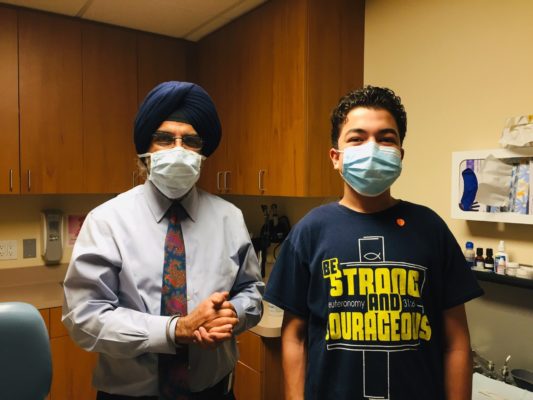
He’s also under the care of Dr. Anchalee Yuengsrigul, CHOC’s medical director of pulmonology. Most recently, Dr. Yuengsrigul helped educate Caleb’s family on how to protect Caleb from COVID-19 given his pre-existing conditions.
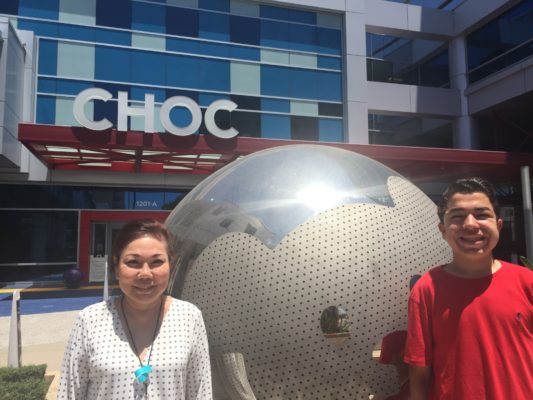
A parent’s perspective
Although Caleb never developed a fear of going to the doctor despite a childhood filled with doctor’s appointments, sometimes when he was younger, he would tell his parents that he was tired of all the doctor visits.
“As a mom that was hard for me to hear because I couldn’t tell him, ‘We can take a break’ because he will be doing this for the rest of his life,” Marie says. “This disease is life-limiting and life-threatening.”
Rory echoes that strain of wanting to make your child’s pain go away and not being able to do so.
“Dads are supposed to fix everything, and moms are supposed to make everything feel better. And when you don’t have the ability to do that, our faith was the only place we could go,” Rory says.
Rory also encourages parents to be mindful of the places they seek out information online.
“It’s important for parents to be careful about what they look at on websites. When we got our diagnosis, we found a lot of scary information online and we were already dealing with getting bit by this diagnosis,” he says. “Always go back to your physician for up-to-date information on your child. Researching online may create more anxiety. These physicians know your child, and they know where to direct you for accurate information”
Two years ago, Caleb’s MPS spread into his eyes.
“That was a blow to us. With MPS, you have times of calmness for a while and then devastating news comes. We take one day at a time, or even one step at a time,” Marie says. “As parents, you get these windows of calm waters, and we have learned to take advantage of those as a time to recharge because you never know the next wave is coming.”
Focusing on what’s most important
Becoming busy with everyday life can make it easy to get swept up in stressors that don’t really matter in the end, Rory says.
“Instead of focusing on to-do lists, I try to focus on, ‘Do my kids know I love them today? Does my wife know I love her today?’”
Marie shares that the family sees every day as a gift of life
“Early on, we learned that every day and every year we had with Caleb was precious. Every birthday is special – we go all out and shower him with gifts and love,” she says. “We live life to the fullest because none of us know what tomorrow will bring.”
Caleb’s life today
Caleb, who is now 14 years old, is an avid runner, something he started when he was 7 years old. His story offers hope, inspiration and courage to others daily.
“Running with MPS is very challenging. Someone who has MPS typically struggles with joint stiffness and pain. It bears some similarities to arthritis,” Dr. Raymond Wang says.
Caleb is also an avid hiker and has climbed tall mountains at a variety of national parks across the country with his family. He exercises every day, whether it’s riding a stationary bike, running or lifting weights. He also enjoys horseback riding, whitewater rafting and hiking.

“Daily exercise has kept him mentally healthy and helped him physically as well,” Marie says. “Early on, his doctors told us to keep his joints flexible so that someday, when and if there is a cure, he will be ready for it. We try to keep Caleb as healthy as we can. That is why exercising is so important.”
In addition to daily activity keeping Caleb physically and mentally strong, his parents want to ensure he never feels limited by MPS.
“You cannot allow this disease to dictate your life. Of course, we have to be mindful of limitations that his doctors tell us, but there is still life to be lived,” Rory says.
Giving back to CHOC’s
In 2014, Caleb and his family joined CHOC Walk in the Park. Their team has grown in size every year since.
“For all that we had been blessed with by CHOC, we wanted to give back and help support other families,” Marie says.
Rory adds, “As a patient, you’re on the receiving end. We wanted to be on the giving end. We give back because we want Caleb to be a part of helping to find a cure and helping other families in some way.”
Caleb’s gotten creative in the past with various fundraising efforts including an ice cream fundraiser, but these days, Caleb is running as to raise funds. This summer, he ran 78 miles – or roughly the equivalent of three marathons – to raise money for CHOC.
“We were so proud of Caleb. He was dedicated to getting up early and going running,” says Marie, who adds that sometimes family members would join Caleb for runs.
“Running is important for our mental health as a family,” Rory says. “His doctors have told us that fresh air is great for him and being outdoors helps him as well.”
Caleb’s advice
“Although my journey with MPS has been a difficult one, I have learned to meet each day with courage and gladness and make the most of the opportunities I do have,” Caleb says. “To those who have just begun their battle with MPS, I would say to have courage, never give up and continue to press on. To those who have been battling MPS or another disease for a long time, I would remind them that you cannot do this alone. You need people around you like your family, friends, nurses, doctors and even your faith to give you courage and comfort. I have been on my journey for 11 years now and it is not easy. The journey has taken lots of courage, endurance and patience. For me personally, my faith has equipped me with courage and given me much comfort and hope, knowing that God has a plan for my life.”

